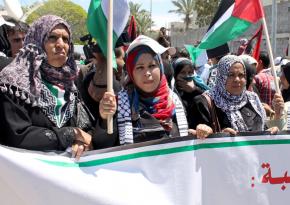Catastrophe for 65 years
reports from the West Bank and Israel on protests to mark 65 years since Israel was established through dispossession of Palestinian people.
EVERY YEAR, Palestinians in Israel, the occupied Palestinian territories and the diaspora mark the Nakba (which means "catastrophe" in Arabic), referring to the 1948 establishment of the state of Israel that led to the expulsion of hundreds of thousands of Palestinians from their land and homes.
This year, protests and commemorations for the 65th Nakba anniversary brought out thousands of Palestinians in the West Bank as well as a significant number of Israelis and international solidarity activists.
Hundreds gathered on May 15 in Ramallah to hear politicians deliver speeches, though representatives of the Western-backed Palestinian Authority, having long since abandoned its democratic mandate in favor of American funds, lack little legitimacy in the eyes of a growing number of Palestinians.
In Bethlehem's Manger Square, thousands came out and held a candlelight vigil. "Nakba has always been the deepest wound in our modern history as 70 percent of our people are still identified as refugees, either in camps or in the diaspora," Najwa Darwish, director of Badil Resource Center for Palestinian Residency and Refugee Rights, told the crowd.

Elsewhere, clashes erupted across the occupied West Bank. Unarmed Palestinians chucked stones in Qalandia, Beituna, Jerusalem and elsewhere, and Israeli forces used tear gas and "riot dispersal means." In one case, four Israeli soldiers were injured in Hebron when their jeep was struck by a Molotov cocktail.
Earlier in the day, "17 Israelis tried to enter [Al-Aqsa mosque] before local Palestinians obstructed them," witnesses told Ma'an News Agency. Clashes broke out, and "Israeli forces intervened to protect the Israelis."
Palestinian citizens of Israel, often overshadowed in mainstream coverage, also mobilized. In defiance of a loud right-wing counter-protest accompanied by a handful of supportive Israeli parliamentarians, hundreds of Jewish and Palestinian students assembled May 13 at Tel Aviv University (TAU). Activists read off the names of demolished villages, students told their families stories, and others recited poetry about the collective tragedy of exile and dispossession.
"The Nakba commemoration at TAU is...held in Hebrew and Arabic [in order] to spread Palestinian history to anyone who doesn't know it...Jewish Israelis in particular," said Ruba Salem, student organizer from the left-wing Israeli political party Hadash, in an interview.
ONE DAY before the British Mandate expired, on May 14, 1948, David Ben-Gurion declared the establishment of a Jewish state, presumably on all 10,430 square miles of the Palestinian map: "We appeal...to the Arab inhabitants of the state of Israel to preserve peace and participate in the upbuilding of the state on the basis of full and equal citizenship and due representation in all its provisional and permanent institutions."
This appeal must have rung hollow to Palestinians as Zionist militias proceeded to destroy more than 500 Palestinian villages and scatter more than 750,000 refugees across the Middle East. As Israeli historian Ilan Pappé notes, thousands more became "present absentees," a Kafkaesque term that refers to "Palestinian refugees wandering within the state of Israel, homeless and stateless."
What Ben-Gurion referred to as "the age-old dream--the redemption of Israel"--has translated into the erasure of Palestine, a process that has continued unabated since 1948.
Israeli settlers continue to chop up the West Bank at a breakneck pace; the saturation bombing of Gaza has become so routine that it's hardly news; the population of refugees exiled in neighboring countries is swelling; and Palestinian citizens of Israel face at least 67 discriminatory laws that impede political rights and reduce access to state resources, particularly land.
In an environment of legal impunity for Israel and its colonial settler front, Nakba has come to refer to an ongoing process that assumes the forms of present injustices: evictions, home demolitions, administrative detention, land theft, imprisonments, extrajudicial killings and other violations of human rights and international law.
"Nakba today means being confined to a little refugee camp that is overlooked in the political process," Ehab El-Shafie, a 21-year-old resident of Al-Amari camp, said in an interview. "It means that, even though it's our right to decide, the president [Mahmoud Abbas] has dropped our [right of] return in order to be 'pragmatic.'"
"Every day is Nakba for me because I'm doubly exiled, demanding to return to my home in Lod, but forced to live in this Ramallah camp under the rule of the PA, which privileges and gives advantages to a tiny minority," concluded El-Shafie.
Six-and-a-half decades after the original catastrophe, there are almost 5 million registered refugees living in camps, 4,900 prisoners in Israeli lockup, and a growing population of Israeli settlers in the West Bank and East Jerusalem that already tops 500,000.
Is it any wonder that Palestinians don't understand the Nakba as a single historical event so much as a daily reality?


